Going Global
 The Fabric of Family in China
The Fabric of Family in China
Nancy Tong, a textile marketing major, spent eight months in China to improve her newly acquired URI fluency in Mandarin, gain hands-on experience in the fashion industry, and learn more about her father’s culture.
Nancy’s family unites two cultures. Her mom was born in Texas, her father in Hong Kong. The couple met in California where Nancy and her brother were born. The family moved to Glastonbury, Conn., when Nancy was 13.
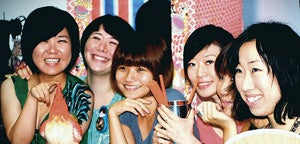
Last summer, Nancy was enrolled in a six week language program at Zhejiang University in Hangzhou with other URI students. During her summer breaks in July and August, she interned at global trend-forecasting firm WGSN in Hong Kong. Returning to Zhejiang University in the fall, she took business courses and continued to study Mandarin.
It wasn’t long before she made local friends and discovered their deep cultural ties. Most were raised speaking local dialects and Mandarin. Her friends shared their views on the importance of family and country history, as well as the benefits of knowing how their present actions would affect their future.
Nancy found sharing meals with her Chinese friends helpful in understanding their culture. “Great emphasis was also placed on the taste, look, and smell of food. I enjoyed eating with chopsticks and reaching over people to grab at food. It’s more casual, loud, and messy. Sharing a meal with friends there is more an activity than just a meal.” She admits, though, she did miss the occasional grilled cheese sandwich back home.
After graduation in May, Nancy plans to spend the summer with her family and then return to China in September. Relocating to Beijing, she hopes to support herself by teaching English and will continue to develop a Web site she created last fall with Linnea Backström, a Swedish friend she met at Zhejiang University.
The Web site, eeera.net/Eeera/home.html, is written primarily in English and includes photos of the local scene and creative events. An accompanying blog includes personal thoughts and promotions of local music, artists, and shops. “The site serves as a source of information for local residents, but we also want to show international viewers that there is a creative force in China’s youth: it’s new and fresh compared to western music offerings,’” Nancy says.
“I didn’t know I would fall in love with China. I really didn’t expect to feel this ultimate connection to the land and people,” she says. “I have spent 20 years in my mother’s home country so I should spend a decent amount of time in my father’s. I have also been able to understand my family, especially my father, a lot better. “
 Road To Success: Medellin, to Kingston, to Paris
Road To Success: Medellin, to Kingston, to Paris
Juan Cano’s often-bumpy road to success runs from Medellin, to Kingston, to Paris. Born in Medellin, he lived there for 14 years until the Revolutionary Armed Forces of Colombia (FARC) rebels kidnapped his father.
Fortunately, one of the rebels recognized Juan’s father as his former boss who had treated him fairly. The rebel, at great risk to himself, released the father from captivity. Still in danger, the family left the homeland they loved to begin a new life in the smallest state of a new country.
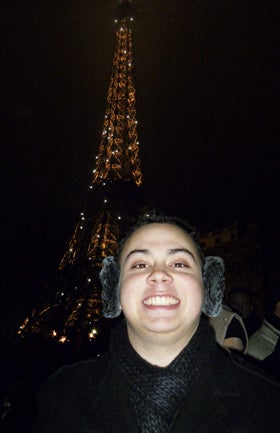 It was a difficult adjustment. Juan, who was learning advanced algebra concepts and trigonometry in Medellin, was placed in a simple addition class as an ESL student in Pawtucket. Yet Juan pushed for the necessary courses to get to college.
It was a difficult adjustment. Juan, who was learning advanced algebra concepts and trigonometry in Medellin, was placed in a simple addition class as an ESL student in Pawtucket. Yet Juan pushed for the necessary courses to get to college.
After a year at CCRI, he was recruited by Talent Development and enrolled in URI’s International Engineering Program, a five-year program that would lead him simultaneously to degrees in mechanical engineering and French. “The world has become a narrower place,” he says, explaining his choice of learning a third language, French instead of using Spanish, in which he is fluent, to fill the language requirement. “The understanding of another language and culture is key to good relationships with business and peers.”
Did You Know?
• URI students study, intern, or help others on six of the seven continents.
• The number of countries our students visit has increased in the past five years.
• Students are choosing to study in places like China, India, Nepal, Vietnam, and the Czech Republic.
Just as Juan’s father was about to become an accredited math teacher, he suffered a stroke and was hospitalized for months. Juan, who had just finished his junior year at URI, was needed at home to translate. Understanding his situation, his URI professors rushed to help, giving him work to do online and sending him updates on what he needed to cover.
Today, Juan is completing his engineering degree with a nine-month internship at Saint-Gobain, a global leader in construction markets and innovative, building materials. He is helping validate a model that describes the stress that glass and thin film undergo in the thermal processes.
His apartment in Saint-Ouen is a few blocks away from Paris. When Juan returns to campus and graduates in May, his road will widen. As he searches for a career that draws on his engineering and language skills, his supportive family will surely be passengers on the ride.
 Helping Orphans in Nicaragua
Helping Orphans in Nicaragua
Matthew Brum and community service go together like balance sheets and audit reports. “I think it’s flowing in my blood,” he says. While working toward a degree in accounting, he has participated in four service trips with the Newman Club.
The East Providence resident hung sheet rock, plastered and painted, and paved driveways to help with hurricane rebuilding efforts in New Orleans—first as a freshman and then as a sophomore.
He’s also made two trips to Nicaragua. During his junior year, he and 14 other URI students dug trenches and built steel structures under scorching sun to help build a new orphanage for disabled and abandoned children in Diriamba. The orphanage is run by the Mustard Seed, a Roman Catholic organization dedicated to caring, sharing and training, and uplifting the most vulnerable members of society—especially handicapped and abandoned children—and marginalized communities.
“I remember getting off the bus and asking myself what I had gotten myself into. Here
I was in a foreign country, unable to speak the language, about to spend a week with children with whom I couldn’t communicate,” he recalls.
Within an hour of spending time with the children—some of whom couldn’t speak, hear, or see—his fears disappeared. “Human interaction doesn’t need a language,” he says. “There is a mutual understanding. Spending time with the children was the most rewarding, playing with them, feeding them, walking them, and rocking them to sleep. All the children wanted was love.”
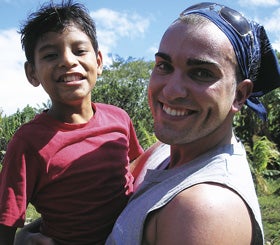 During their stay, the URI students were driven to see the Nicaragua garbage dump. “It wasn’t your average dump. It was a town of more than 3,000 people located within a garbage dump filled with debris, trash, and unimaginable pollution,” Matthew says.
During their stay, the URI students were driven to see the Nicaragua garbage dump. “It wasn’t your average dump. It was a town of more than 3,000 people located within a garbage dump filled with debris, trash, and unimaginable pollution,” Matthew says.
Although the students brought food for their visit, it quickly ran out. “I’ll always remember trying to carefully break the Ritz crackers my friend had bought so that we could give more kids something to eat,’” says Matthew, who left 90 percent of the clothes he took with him in Nicaragua. “I had enough clothes at home. They didn’t” says the senior, who has already been hired by CBIZ Tofias and Mayer Hoffman McCann P.C.—Tofias New England Division, together the 8th largest accounting firm in the U.S.
The Newman Club needed to raise $18,000 to return to Nicaragua last winter. With help and fundraising support of the nearby Christ the King Church, the 16 URI students raised $25,000. “That extra was enough to buy a bus for the orphanage,” says Matthew.
When they boarded the plane to Nicaragua, the URI students carried 15 bags of donations filled with Mustard Seed wish list items.
 Saving African Lives One Clean Drop at a Time
Saving African Lives One Clean Drop at a Time
Sophia Narkiewicz ’08 has always found water fascinating. “It’s our biggest commodity and our greatest natural resource,” she says.
After spending nearly 14 weeks during two trips to the rural Limpopo Province of South Africa, the civil and environmental engineering graduate student has a deeper appreciation for clean water.
The World Health Organization requires water to have less than one count of coliform bacteria per 100 milliliters to be drinkable. In the Limpopo Province, which lacks a regulatory system, it’s common to find 4,000 to 6,000 counts per 100 milliliters.
To compound the problem, South Africa has one of the highest HIV rates in the world. In the region where Sophia worked, for example, 18.5 percent of the pregnant women are HIV positive. So when many South Africans drink the contaminated water, they get sick. When an HIV patient drinks the contaminated water, even if they are receiving anti-retroviral drugs, they have a hard time fighting a variety of diarrheal diseases caused by microorganisms and often die.
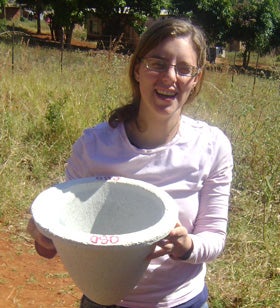 Enter a deceptively simple porous clay pot that filters water. The pot, which fits inside a five-gallon bucket with spigot, is proving to be a lifesaver.
Enter a deceptively simple porous clay pot that filters water. The pot, which fits inside a five-gallon bucket with spigot, is proving to be a lifesaver.
Sophia is part of a nine-month collaboration between URI Assistant Civil and Environmental Engineering Professor Vinka Craver, the University of Virginia, and the University of Venda (located in South Africa) to help teach HIV patients how to use the filter and assess its effectiveness.
During her first stay in Limpopo Province, Sophia teamed up with students at the University of Venda, a graduate student from the University of Virginia, and nuns that operate the nearby St. Joseph’s clinic. Together they recruited 93 individuals to participate in the study, surveyed them about their health, water consumption and demographics, and taught them how to use the filter.
Sophia returned to South Africa this January to make sure the filters are still performing properly and test their effectiveness. So far there has been a significant difference in the health of HIV patients who drink the filtered water compared with those that don’t. And word of that success is spreading.
The URI graduate student feels that regardless of her future path of civil engineering, she will never forget the true need of clean water for each and every person.
 Australia: One of Many Stops
Australia: One of Many Stops
Stacey Konstantinov was nearly born with a suitcase in her hand. Her parents emigrated to America when she was three and moved around the country, living in Michigan, Florida, and New York before settling in West Orange, N. J.
Growing up in America in a Russian family and with no siblings, Stacey had to figure things out on her own.
She drew upon those earlier experiences as a URI sophomore. While spending the spring semester studying at Bond University on the Gold Coast in Queensland, Australia, she got mononucleosis.
“I had to know where to go, what to do, and who to see on my own. These tasks sound so simple until you’re in another country doing them on your own,” says the marketing major.
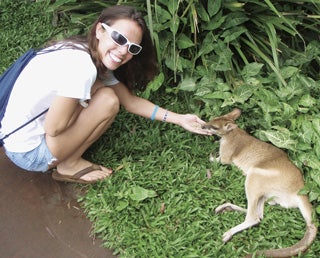 “Studying abroad is such a personal journey you can only experience it by doing it,” she says. “I learned how to become self-sufficient. Although I’ve always been an independent person, this experience taught me that even more.”
“Studying abroad is such a personal journey you can only experience it by doing it,” she says. “I learned how to become self-sufficient. Although I’ve always been an independent person, this experience taught me that even more.”
When she was in high school, Stacey knew she wanted to study in Australia one day because of her interest in marine biology. “Australia was one of the greatest places to learn about marine life, especially with the Great Barrier Reef, the largest reef in the world, located there. Although marine biology is no longer my major, I still enjoy learning about it.”
She found her Australian classmates’ study habits differed from her own. “Many URI students will gather and discuss the way they plan to study for an exam and with whom. The Australians were quieter about their study habits. They sit down and get everything done without much discussion.”
She also noticed that her Australian peers participated a lot more in classes. “At first, I thought it might be because the Americans were shy in a different country at a new school. However, even after a few months, I noticed the Aussies were still more talkative. I think this is a great characteristic because not only did I learn from my professors, but from my peers as well.”
Travel continues to be a road that winds throughout the URI junior’s life. Once acclimated to America, her family traveled to Spain, Barbados, Bahamas, Dominican Republic, and other U.S. states. During this year’s winter break, Stacey visited Costa Rica with family and friends.
Along with her love of travel, she loves sports and hopes to combine the two after graduating in 2011. Her goal is a job in a marketing department for a sports team. She keeps a list of the top 20 places she would like to visit and plans to check them off at some point in her life. Meanwhile, her suitcases are nearby.
 To Fiji with Love
To Fiji with Love
Brett Geaber’s mother always envisioned her son teaching children at the Gospel School for the Deaf in Suva, Fiji, where she volunteered as part of her ministry in 2004.
While Brett was putting an internship together, Diane Geaber was diagnosed with pancreatic cancer. She died last June.
“I had to fulfill the promise I made to her so I picked up the pieces and flew to Fiji last Sept. 12,” says Brett, who earned his communication studies degree in December. “When I arrived after crossing the dateline, it was Sept. 14, my mom’s birthday. I didn’t plan it, but I knew that it was a sign.”
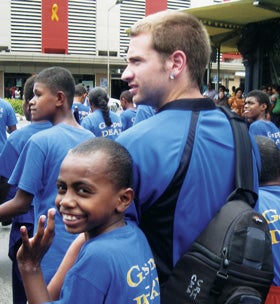 During Brett’s internship, he kept his cameras rolling while teaching children martial arts and hip hop to create a variety show for friends and families.
During Brett’s internship, he kept his cameras rolling while teaching children martial arts and hip hop to create a variety show for friends and families.
“I was teaching something that a lot of them had never seen before so I wasn’t sure how they would react,” the Kingston resident recalls. “They loved hip hop and picked it up so fast it was incredible. People in Fiji, even the kids, are open minded and welcoming. They all made me feel at home and part of the family so that after two months I didn’t want to leave.”
When Brett was young, he began creating short films after finding his parents’ old video camera. He combined film with his hobby of recording hip-hop music with friends to create music videos in high school.
His interest in martial arts and performance began when he watched the Teenage Mutant Ninja Turtles and Shirley Temple. When the Ichiban Karate Studios in Wakefield opened, he begged to join. His parents finally relented and signed him up when he was four. A quick learner, he became part of a demonstration team when he was six. Today he teaches at the studio and holds a fourth degree black belt in Shorin-Ryu Shodokan and a first-degree black belt in Kobudo (weapons).
Hip-hop dance and break dancing expertise followed naturally. While at URI, he was a member of the hip-hop dance team Flavor Unit. He combined all three hobbies during his internship.
“This was a time to reflect and come to grips with a lot of things,” says the 23-year-old. “Through these beautiful kids, I saw reflections of my mom.”
Brett created a 15-minute documentary about his trip. “My message is that you can be a light anywhere in the world. You just have to have faith.”
Professor Alain-Philippe Durand who directed Brett’s internship calls the documentary innovative. “Not only was I impressed by the quality of his film, but I am also very impressed by Brett’s work with the students while at the school,” says the professor of French and Francophone studies.
By Jan Wenzel ’87
wenzel@advance.uri.edu
 Home
Home Browse
Browse Close
Close Events
Events Maps
Maps Email
Email Brightspace
Brightspace eCampus
eCampus


